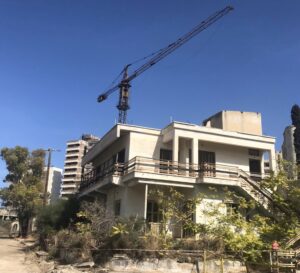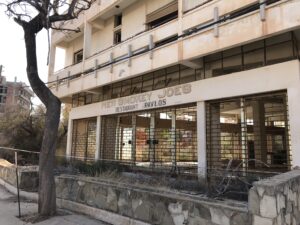 Varosha was a bustling wealthy city and one of the most popular and attractive holiday resorts in the whole of Cyprus before 1974. As a result of the war, however, the inhabitants of this city fled and Varosha eventually turned into a ghost town. Since that time, Varosha has been a fenced-off military area controlled by the Turkish army. There is also United Nations presence in the abandoned city.
Varosha was a bustling wealthy city and one of the most popular and attractive holiday resorts in the whole of Cyprus before 1974. As a result of the war, however, the inhabitants of this city fled and Varosha eventually turned into a ghost town. Since that time, Varosha has been a fenced-off military area controlled by the Turkish army. There is also United Nations presence in the abandoned city.
Varosha has been a subject matter in the negotiations between the two sides for the settlement of the Cyprus problem. In the negotiations that have been continuing for several decades, it was foreseen that it would be returned to the Greek Cypriot administration in the case of a solution.
The failure of the inter-communal talks (most recently in Crans Montana in 2017) and lack of a prospect for a solution, however, has led the Turkish Cypriot administration to start a process of reopening of Varosha.
Recently, the Turkish Cypriot government, for the first time since 1974, started allowing civilians to enter the fenced off area and use the beaches. The government announced that its intention is to open the whole city under Turkish Cypriot administration, by returning the properties to their 1974 owners (in accordance with the UN Security Council resolutions that call for the return of the city to its original inhabitants). In practice this means that the properties will be returned to the Greek Cypriot owners through the Immovable Property Commission.

As it can be read in the articles published on the website of Erginel Law, the Immovable Property Commission (IPC) was set up through law no. 67/2005 in accordance with the rulings of the European Court of Human Rights (ECHR) and it received recognition from this court as an effective domestic remedy for the cases of properties of Greek Cypriots in Northern Cyprus.
Consequently, so far, 6,740 applications have been lodged with the Commission. The Commission has awarded GBP 312,118,627.- to the applicants as compensation (statistics valid as of October 2020). Moreover, it has ruled also for exchange and restitution (return) of properties. Further to the restitution decisions, the Greek Cypriot owners of properties received a TRNC title for their properties and now they are free to use them (reside, sell, rent etc) as they wish.
We expect that the legal context for the reopening of Varosha will be based on the restitution mechanism of the IPC, which has the blessing of the ECHR. In 1974 there were over 6,000 title deeds relating to the fenced off area of Varosha. It can be expected that many Greek Cypriots will make applications to the IPC to request the return of their properties. At the moment there are 281 pending applications to the IPC concerning properties in Varosha.
Our recommendation for those Greek Cypriots who wish to seek return of or compensation for their properties is to make applications early on to reduce the time needed to achieve a result, as the IPC would be treating the applications in the order they are received.
In the meantime, Erginel Law, will continue to monitor the legal and practical developments carefully in order to be able to best serve our clients who wish to claim remedies for their properties in Varosha.
Read also
EU and Northern Cyprus: Aid Programme for Turkish Cypriot Community and Green Line In the…
We often hear about different kinds of title deeds in the TRNC. To be able…
The Immovable Property Commission (IPC) was set up under the Immovable Property Law (67/2005) in…
